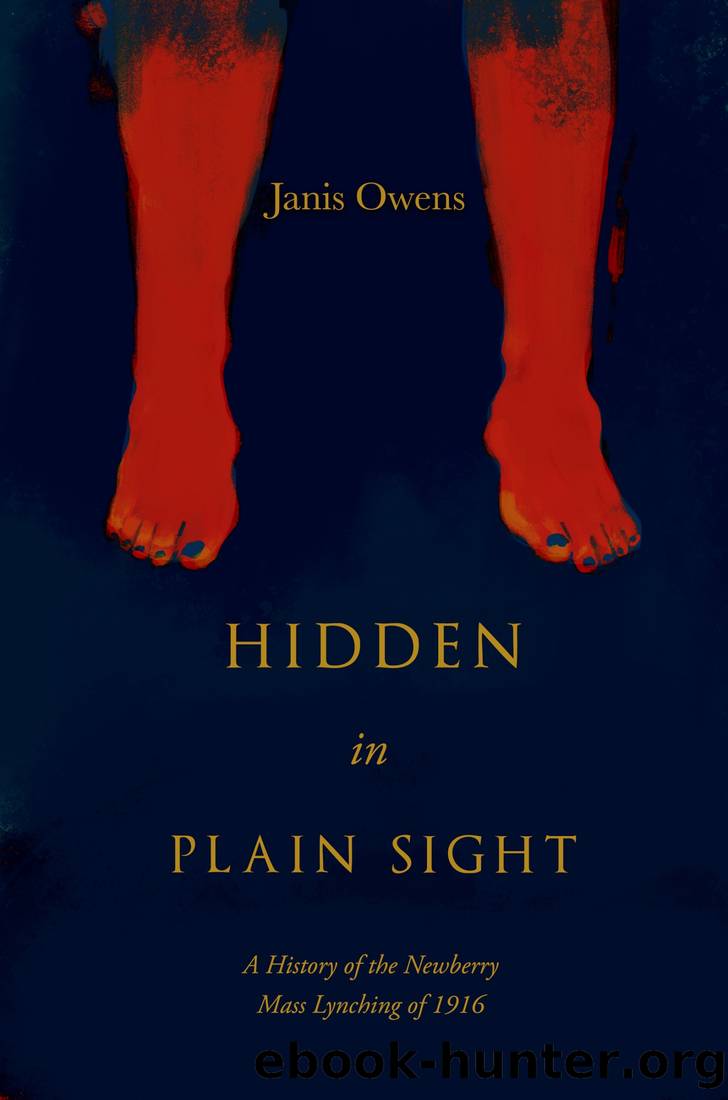Hidden in Plain Sight: A History of the Newberry Mass Lynching of 1916 by Janis Owens

Author:Janis Owens [Owens, Janis]
Language: eng
Format: epub
Tags: history, United States, State & Local, South (AL; AR; FL; GA; KY; LA; MS; NC; SC; TN; VA; WV), Social Science, Ethnic Studies, American, African American & Black Studies, General
ISBN: 9781646633685
Google: bSsTzgEACAAJ
Publisher: Koehler Books
Published: 2020-12-14T00:00:00+00:00
Chapter Eight
THE CAPTURE OF BOISY LONG
The capture of Boisy Long on Sunday evening, August 20, 1916, was presented in the press as a cut-and-dried moment of extreme good luck on behalf of the Alachua County sheriffâs department. According to the Ocala Evening Star, Long randomly approached an âold colored preacherâ named Squire Long at his farm seven miles northeast of Newberry in the Bennington Section, and asked for food.169 The Tampa Tribute parsed out a slightly longer narrative, that Boisy Long asked for food the first night and was given it by Squire Long, who did not recognize him. 170
According to the Tribuneâs version, Boisy Long was âmuch jaded because of lack of food,â and returned the next evening to ask for more help. This time, Squire Long recognized him as a fugitive and with the help of his son, Jackson, immediately turned Boisy Long over to Sheriff Ramsey, at the curiously recurring hour of two in the morning, to the relief and approbation of all. âThe action of the old negro, Squire Long, is [sic] bringing the murderer to the Gainesville jail was very unusual, very sensible, and canât be too highly commended.â171
The accounts made for a tidy ending and a compelling bit of storytelling. Squire Longâs portrayal as a âwise old colored preacherâ reduced his part in Boisy Longâs arrest to recognizable elements for the digestion of white readersâthe story of the negro desperado being apprehended, against all expectation, by a wise old member of his own tribe. According to the rules of blood-law, such a transaction would return harmony to the regionâa member of the offending tribe offering up the life of the offender.
That was possibly the underlying storyline that law enforcement hoped to convey, post-lynching, though many of the details were deliberate lies. In truth, Squire Long was not an elderly old preacher, but younger by three years than Deputy Wynne. Boisy Longâs appearance at his door was not random, and it is doubtful they were strangers, as their families had many connections to Black Jonesville.
Squire Longâs mother, Flora Long, owned land in Jonesville in 1900 near Dudley, the closest store, and the Dennis/Long/McHenry families, who were only separated by a few houses. The Crisis reported that Squire Long was, in fact, Boisy Longâs uncle, a relationship that was denied by the family as a matter of survival.172 The connection better explains why Boisy Long would have sought him out for assistance, as Squire Long was a prominent preacher, healer and farmer. In essence, he was a figure well-known in every generation of Southern life, the aspiring uncle born in modest circumstances whoâd done well for himself.
Boisy Long, who was wounded in his arm, would have had to have traveled the seven miles to his uncleâs farm by foot, where family members say he hid in the fields, as the Tampa paper reported. For Squire Long to fail to recognize him seems unlikely, as members of the posse had visited Squire Long and, according to The Crisis, had terrorized him.
Download
This site does not store any files on its server. We only index and link to content provided by other sites. Please contact the content providers to delete copyright contents if any and email us, we'll remove relevant links or contents immediately.
| Africa | Americas |
| Arctic & Antarctica | Asia |
| Australia & Oceania | Europe |
| Middle East | Russia |
| United States | World |
| Ancient Civilizations | Military |
| Historical Study & Educational Resources |
Machine Learning at Scale with H2O by Gregory Keys | David Whiting(4289)
Never by Ken Follett(3930)
Fairy Tale by Stephen King(3365)
Oathbringer (The Stormlight Archive, Book 3) by Brandon Sanderson(3124)
The Man Who Died Twice by Richard Osman(3064)
Will by Will Smith(2904)
Rationality by Steven Pinker(2348)
Can't Hurt Me: Master Your Mind and Defy the Odds - Clean Edition by David Goggins(2319)
The Dark Hours by Michael Connelly(2299)
Friends, Lovers, and the Big Terrible Thing by Matthew Perry(2211)
The Dawn of Everything: A New History of Humanity by David Graeber & David Wengrow(2186)
Principles for Dealing With the Changing World Order: Why Nations Succeed and Fail by Ray Dalio(2031)
A Short History of War by Jeremy Black(1835)
HBR's 10 Must Reads 2022 by Harvard Business Review(1832)
Go Tell the Bees That I Am Gone by Diana Gabaldon(1746)
A Game of Thrones (The Illustrated Edition) by George R. R. Martin(1707)
Kingdom of Ash by Maas Sarah J(1661)
515945210 by Unknown(1660)
443319537 by Unknown(1542)
